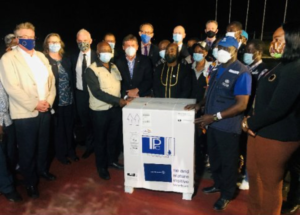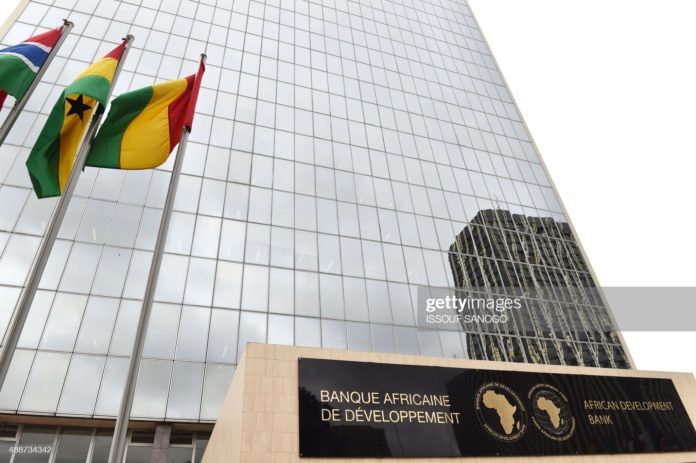By Benjamin Tegbeh|Abidjan
The African Development Bank (AFDB) has lauded several African countries for what the financial institution considered as an improvement in the fight of Covid 19.
According to a press statement from the communication department of the bank issued in Abidjan on Saturday, June 19, 2021 the have been an increased in the number of screening laboratories in Africa though the support of the African Development Bank that have saved thousands of lives.
AFDB press release also noted that a daily screening capacity in African countries has immensely increased from thirteen thousand two hundred (13,200) at the start of the epidemic toone hundred and five thousand (105,000).
The communication furthered revealed the structural fragility of health facilities in Africa at the beginning of Covid 19 in March 2020 at which time Africa was up against the wall, disarmed in the face of the scale of the effects of a virus that emerged in Asia and quickly spread across the globe.
“Only two African countries were then able to detect the new Coronavirus; Senegal, with its Institute Pasteur, and South Africa, the most industrialized country on the continent”.
“But Africa recovered quickly, Countries have started to set up screening laboratories solidly supported by the African Development Bank they have achieved a logistical and scientific feat”.
“From the onset of the pandemic, the Bank released $ 2 million in emergency aid to help World Health Organization (WHO)Africa to build its capacity to support African countries”.
“Since the summer of 2020, the Bank has been helping countries cope with the health emergency and the socio-economic consequences of the pandemic, notably through its $ 10 billion Covid-19 Rapid Response Facility”.
From the summer of 2020 according to this financial organization, countries rehabilitated their inadequate laboratories and those that did not have them were able to acquire them.
“By the end of the fall, virtually all African countries were able to test their populations, some of them even had good enough laboratories to tackle the genetic sequencing of the virus”.
After a few months that statement maintains that African countries which had very few diagnostic devices, acquired two, ten or more laboratories, depending on their geographic and demographic characteristics.
South Africa, Egypt, Morocco and Algeria quickly stood out in terms of the number of daily tests thanks to the proliferation of laboratories made operational detect the virus, a race against time won hands down.
Early detection has been instrumental in limiting the spread of the virus and has helped trace, isolate and treat confirmed cases.
When the first case of contamination was announced on March 11, 2020, Cote d’Ivoire had no laboratory for the detection of the coronavirus; but now has about ten.
“In Burkina Faso, where samples were transported to Dakar, in the early hours of the disease, the number of screening laboratories has now increased from 7 to 18 thanks to the support of development partners including the African Development Bank test results can now be obtained within 48 hours”.
“The Nigerian Epidemic Control Center (NCDC) has set up testing centers across Africa’s most populous country to detect the various cases in Kenya, to deal with the emergency, machines initially intended to test for HIV, tuberculosis or avian flu were reoriented to screen for Covid-19, before the arrival of new machines acquired by the government, thanks to the support partners including the Bank”.
For Atsuko Toda, acting vice-president in charge of Agriculture and Human Development at the African Development Bank said “the multiplication of screening tests, thanks to efficient laboratories installed in African countries, this has encouraged the reopening of savings.”
Increased Covid-19 testing facilities
According to statistics compiled in March 2021 by the Bank’s Regional Development, Integration and Service Delivery Complex (RDVP), the number of analytical laboratories in Malawi has increased tenfold from 14 to 164 and by 2.5 in Ethiopia to reach 66; in the Central African Republic, five new screening laboratories have been created, the release noted.
“The results were enormous on the number of populations screened, South Africa has increased the number of daily screenings seven-fold from 5,000 to 35,000, Ethiopia (3,000 to 12,400), Burkina (268 to 1,160)”.

Nouridine Kane Dia, representative of the African Development Bank in Niger, recently welcomed the Bank’s “effective” support to this fragile Sahel country stressing that “the Bank’s support has helped to strengthen Niger’s capacity to respond more effectively to future pandemics and public health shocks”.
“The challenge for African countries has been to control contamination but also to relax restrictive measures to allow the reopening of economies because the long-term extension of containment measures risked creating an economic and social crash”, underlines Atsuko Toda.
In total, according to the RDVP, the support of the Bank and other partners made it possible to increase the daily screening capacity of African countries from 13,200 at the start of the epidemic to 105,000; 100,000 health workers have been trained and 314 intensive care units are now available for patients with Covid-19, up from 50 on average at the onset of the disease.
“It’s a race against time won hands down, now we have to win the war against the coronavirus, says Atsuko Toda, we started from almost zero, when you see the progress made in a few months, you realize that a long way has been come.“























Comments are closed.